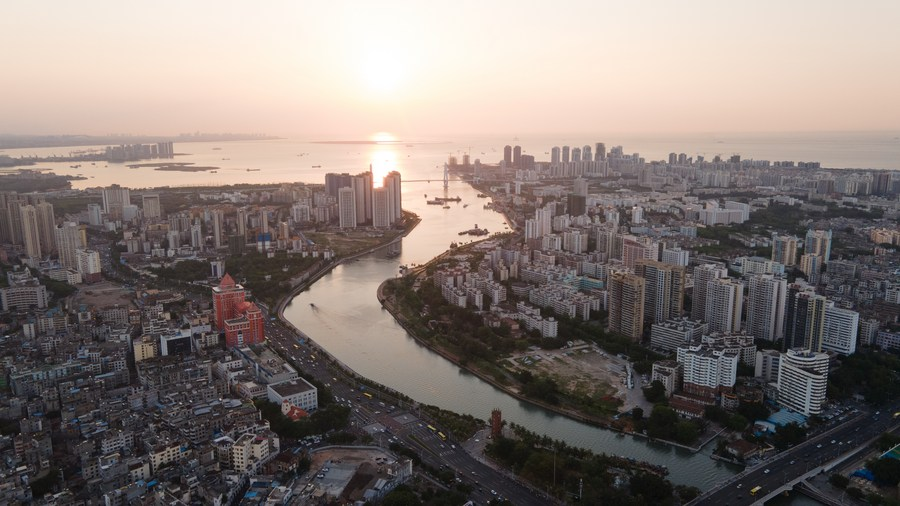Aerial view of Haikou, capital of south China's Hainan Province, May 4, 2021. /Xinhua
Editor's note: Dong Qiang is the dean of the Yenching Academy, a postgraduate college of Peking University. The article reflects the author's opinions and not necessarily the views of CGTN.
Hainan has long been a hot place both in China and in the international community. China proposed setting up a free trade zone in Hainan on April 13, 2018. It has been five years since the proposal. On this special day, Hainan is a hotspot again.
Many know Hainan as a gateway to China, facilitating trade and investment. The concept of the Hainan Free Trade Port, with many Chinese characteristics, is highly innovative and exploratory since it provides a rare model for young Chinese and international scholars to understand today's China and its future development in diverse areas, including economic development, ecological civilization and people-to-people exchanges.
In the years, Hainan has achieved a lot both in economic and social aspects. In terms of high-quality development, Hainan has fully, accurately and comprehensively implemented the new development concept, focused on structural adjustment and growth drivers, and promoted the establishment of a modern industrial system led by tourism, modern service industry, high-tech industries and efficient agriculture with tropical characteristics. In the past five years, the province's GDP has grown by an average of 5.3 percent annually, successively crossing two thresholds of 500 billion yuan ($72.7 billion) and 600 billion yuan, reaching 681.82 billion yuan in 2022.
Furthermore, on April 13, 2018, the central government announced its support for building Hainan Province into a national ecological civilization pilot zone. This occasion is an excellent opportunity for us to gain a firsthand experience of the efforts made by Hainan, especially Lingshui County, in protecting biodiversity, which aligns with the UN Sustainable Development Goals of climate action and protecting life below water and on land. We can find egrets flying and fish swimming energetically at the Mangrove National Wetland Park, presenting a beautiful picture of the harmonious coexistence of human beings and nature. The ecological security system of Lingshui – a large mixed population of Li and Miao ethnic minority groups, rich in natural resources, mainly mineral, thermal and marine resources – provides a safe guarantee of our humanity.

A security guard takes temperature of visitors during the 17th Hainan International Auto Exhibition in Haikou, south China's Hainan Province, May 22, 2020. /Xinhua
In the three years since the outbreak of the COVID-19 pandemic, global people-to-people and cultural exchanges have been severely affected. What's worse, public conversation has been severely polarized at every level. There is more shouting than listening, intimidation than persuasion, and more on-screen and keyboard comments than physical contact. The lifting of COVID-19 restrictions means that life is gradually returning to normal. We should seize the opportunity to foster more dialogues that allow us to disagree productively; we should be more open-minded, approachable, and eager to engage and find ways to communicate our ideas with respect for one another's beliefs and identity better than the world before and during the pandemic.
In this aspect, students can play an important role in the people-to-people and cultural exchanges. And that's also one of the reasons for Peking University's Yenching Academy to hold the Yenching Global Symposium 2023 in Hainan as the university has been the foremost domestic academic setting for understanding China for over a century.
AI-dominated technological innovations, knowledge economy and other elements are rapidly changing how humans live. There is no doubt that development is important. But, while thinking about the path toward human prosperity, we need to consider the long-term preservation and legacy of humanity and our civilizations, and the protection of nature. Having constructive debates on confronting these issues with mutual respect for opposing views is vital to ensuring that every voice is heard and assessed for its merits.
In the face of future challenges in an increasingly divisive and complex world, we should strive to cultivate our scholars to be more creative and visionary, engage in productive disagreements, possess excellent human qualities, etc.
And with the preparation for the Yenching Global Symposium 2023 in full swing, it offers a platform for engaging dialogues and interactive sessions where students and professionals from across the world and various fields can share their insights and visions for development and exchanges.
Source:
CGTN
Written by:
Dong Qiang

